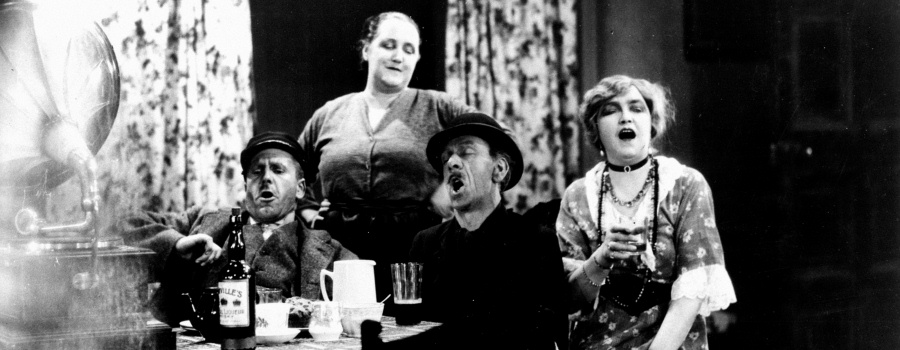A Year with Hitchcock: Juno and the Paycock, by Reed Lackey
21 Feb
Whew. After two very strong entries (Hitchcock’s final silent film and his first talkie), this return to domestic drama is a sharp left turn off a steep cliff. It received overwhelmingly positive reviews in its initial run, but even Hitchcock himself regards it as something of a let-down.
Based on the play by Sean O’Casey (and also sometimes known as “The Shame of Mary Boyle”), this understated drama focuses on the fortunes and misfortunes of an Irish family amidst the turmoil of the Irish Civil War. Unfortunately that sentence I wrote is about as interesting as anything in the film.
Although based on a hit play, the film feels painfully uncinematic. The long stretches of dialogue with little to no visual dynamism can feel tedious even adapted with more current sensibilities, but it becomes downright insomnia-curing here. Everyone’s thick Irish accents make following the particular narrative beats challenging, and I feel even now a certain disservice that I’m delivering to the material by being culturally removed from its more relevant particulars. But beyond all that, the filmmaking style is simply boring. We know of several later films Hitchcock would make in which all the pertinent action took place in a singular room, but those film (Rope, Rear Window, Dial M for Murder…) utterly crackle with suspense and complexity. Here, Hitch feels unfocused and often downright lazy, setting up a standard shot with all the players visible which lasts for more than 6 minutes without so much as an insert. The visual style is as if from the view of an audience member inside a proscenium theater, and it doesn’t help the material to highlight it so blandly.
There are moments when the story feels like it’s hiding something interesting, and given Hitchcock’s reputation, you might be tempted to lean in and examine it more closely. But there’s no need. The only major surprises in the film are forecast from miles away and even their reveals are handled rather unceremoniously. By the time you reach the somewhat poignant final moment, any chance that moment had to incite emotion or inspiration will have been squandered in too much talking and too little interest.
I (obviously) really struggled with this one. Clearly there must have been something personal about this story for Hitchcock to adapt and direct it himself, (he praised O’Casey’s play and his larger body of work as well) There are occasional elements which, if told to someone else, may feel like the stuff of rich drama (and perhaps were I more personally familiar or connected with the play, I’d find more enjoyable substance in how it’s presented). But here even the most dramatic elements sadly don’t even have the fizzle of a 2-year-old open soda bottle.
Despite these bland limitations, the film garnered significant praise from contemporary critics. Hitchcock, however, was of the opinion (and I happen to agree) that he’d cheated his audience by merely translated the literary merit of the source material without formulating a cohesive and cinematically compelling visual one.
I’d recommend literally any of his silent films over seeing this one.
Summary:
Accessibility – Available on several low-budget DVD collections
Themes – Social Inequality, Familial Struggles, Working Class Challenges
Category – For Completists Only




No comments yet